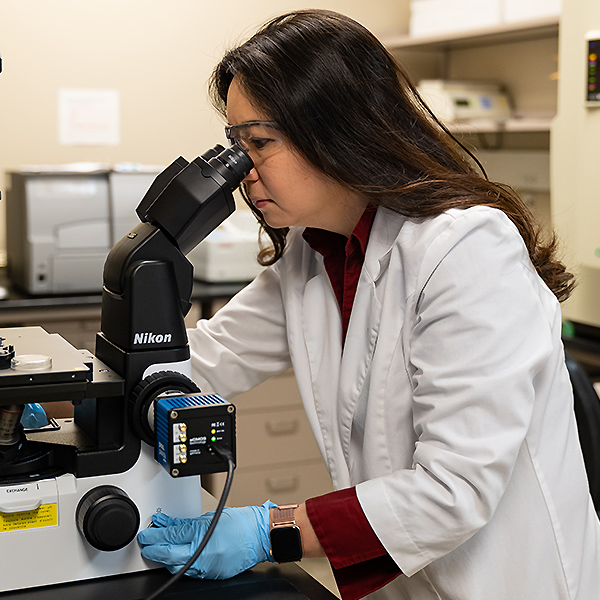
Annelise Nguyen is broadening the School’s mission and advancing breast cancer research.
Annelise Nguyen, associate dean for research and professor of toxicology at Texas Tech University’s School of Veterinary Medicine, has a passion for research and discovery. Nguyen joined the School of Veterinary Medicine in 2020 from Kansas State University and continues her research in cancer pathogenesis and toxicology.
Nguyen’s research has always centered around current challenges in oncology, specifically those in breast cancer, a cancer prone to re-occurring tumors and the most common in women in the U.S. representing 30% of all new female cancers diagnosed annually. According to Dr. Nguyen, “cancer is a complex disease and often drugs are found to be ineffective not because of their lack of efficacy but due to lack of adequate delivery to cancer cells.”
Early in her career, Nguyen started to investigate how cells communicate and how intercellular channels could be leveraged to help deliver and increase the efficacy of existing drugs. This work which focused on the use of ‘gap’ junctions, enabled her and colleagues to develop a means to deliver cancer drugs via a non-specific channel based on size and not the target alone.
A further challenge Nguyen sought to address focused on the growing trend to reduce the number of animals used in research. This work resulted in the creation of an improved extracellular matrix enabling the development of 3D models capable of recapitulating human tumor-like organoids and providing an ‘artificial home’ for cells to grow ex vivo. The new ‘PepGels’, now commercially available, rely on motion kinetic for extraction of organoids from artificial home and eliminate the disadvantages of existing products.
At the School of Veterinary Medicine, Nguyen continues to develop new models that address unmet needs and has expanded her work beyond breast cancer to prostate cancer. She is applying these technologies toward veterinary health, generating canine, feline, and equine tumor models.
While time management is key, her dual role as a researcher and administrator “provides for mutual benefit”, says Nguyen, who further commented that “I am effective in my role as Associate Dean because I am a scientist and vice versa.” In addition to her active research program in the School of Veterinary Medicine, as associate dean for research, she helped establish the Ph.D. program in One Health Sciences, the multi-year process was approved by the Texas Higher Education Coordinating Board (THECB) in April 2022 and is currently pending final approval by the Southern Association of Colleges and Schools Commission on Colleges (SACSCOC). This unique program is designed to develop scientists with broad-based competencies in One Health, cutting-edge discipline-specific research skills, and transdisciplinary research planning and implementation skills.
Annelise Nguyen is committed to innovation at Texas Tech and to the School of Veterinary Medicine as well as making a direct impact on the community, region, state, nation and the world.
